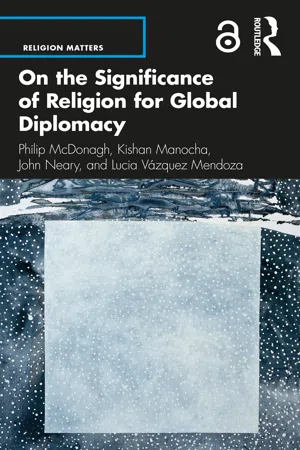
On the Significance of Religion for Global Diplomacy
- 160 pages
- English
- ePUB (mobile friendly)
- Available on iOS & Android
On the Significance of Religion for Global Diplomacy
About this book
What could it mean, in terms of strengthening multilateral diplomacy, if the UN, the Organisation for Security and Cooperation in Europe (OSCE), the European Union, and other regional diplomatic frameworks engaged more creatively with a religious perspective?
In this ground-breaking volume it is argued that international organisations, backed by governments, can and should use their convening power to initiate new, multi-layered frameworks of engagement, inclusive of the representatives of religion. This can make multilateralism more fit for purpose and have a major impact over time on our planetary future.
The book is divided into an introduction and six chapters:
-
- Towards a culture of encounter inclusive of the world's religious traditions
-
- Structural questions in 21st-century diplomacy
-
- Knowing what we ought to know: the issues that face 21st-century diplomacy
-
- Towards the global objective of a common peace for humanity
-
- Understanding how change happens
-
- The diplomacy of the two standards
-
- The development of new frameworks of engagement
A brief outline is offered of what an all-European initiative – an a gora for Europe – might look like if, in the 2020s, there were the political will to inaugurate a European regional process reflecting the orientation and methodology proposed in the book.
Combining cutting-edge research and reflection, with concrete recommendations for academics, religious actors, policy makers, and practitioners, this concise and accessible volume helps to build bridges between these oftentimes separated spheres of engagement.
The Open Access version of this book, available at https://doi.org/10.4324/9781003053842, has been made available under a Creative Commons Attribution-Non Commercial-No Derivatives 4.0 license.
Frequently asked questions
- Essential is ideal for learners and professionals who enjoy exploring a wide range of subjects. Access the Essential Library with 800,000+ trusted titles and best-sellers across business, personal growth, and the humanities. Includes unlimited reading time and Standard Read Aloud voice.
- Complete: Perfect for advanced learners and researchers needing full, unrestricted access. Unlock 1.4M+ books across hundreds of subjects, including academic and specialized titles. The Complete Plan also includes advanced features like Premium Read Aloud and Research Assistant.
Please note we cannot support devices running on iOS 13 and Android 7 or earlier. Learn more about using the app.
Information
1
Structural questions in 21st-century diplomacy
Public truth in a pluralist global society
Finding a common language
How then, in an inherently pluralist world, can the conversation about the future begin?
If every action aims at some good, is there a higher good, such as happiness, which is valued for its own sake and becomes the ‘unifying focus of all our scattered enterprises’?(Veale, 2006, p. 238)
Which avenues of enquiry are relevant to politics? Are there forms of knowledge, such as (in ancient Greece) medical expertise or ship-building, that are valid in themselves, irrespective of anyone’s overall worldview? In our search for a ‘unifying focus’, is there a role for ‘wisdom’ or the ‘wise person’ – poet, prophet, or philosopher – who relies on something mo...
Table of contents
- Cover
- Half Title
- Series Page
- Title Page
- Copyright Page
- Table of Contents
- Notes on the Authors
- Acknowledgements
- Acknowledgement of cover artist
- List of abbreviations
- Summary and recommendations to governments, international organisations, and civil society
- Introduction: towards a culture of encounter inclusive of the world’s religious traditions
- Chapter 1: Structural questions in 21st-century diplomacy
- Chapter 2: Knowing what we ought to know: the issues that face 21st-century diplomacy: the issues that face 21st-century diplomacy
- Chapter 3: Towards the global objective of a common peace for humanity
- Chapter 4: Understanding how change happens
- Chapter 5: The diplomacy of the two standards
- Chapter 6: The development of new frameworks of engagement
- Chapter 7: Epilogue: an agora for Europe?
- Index